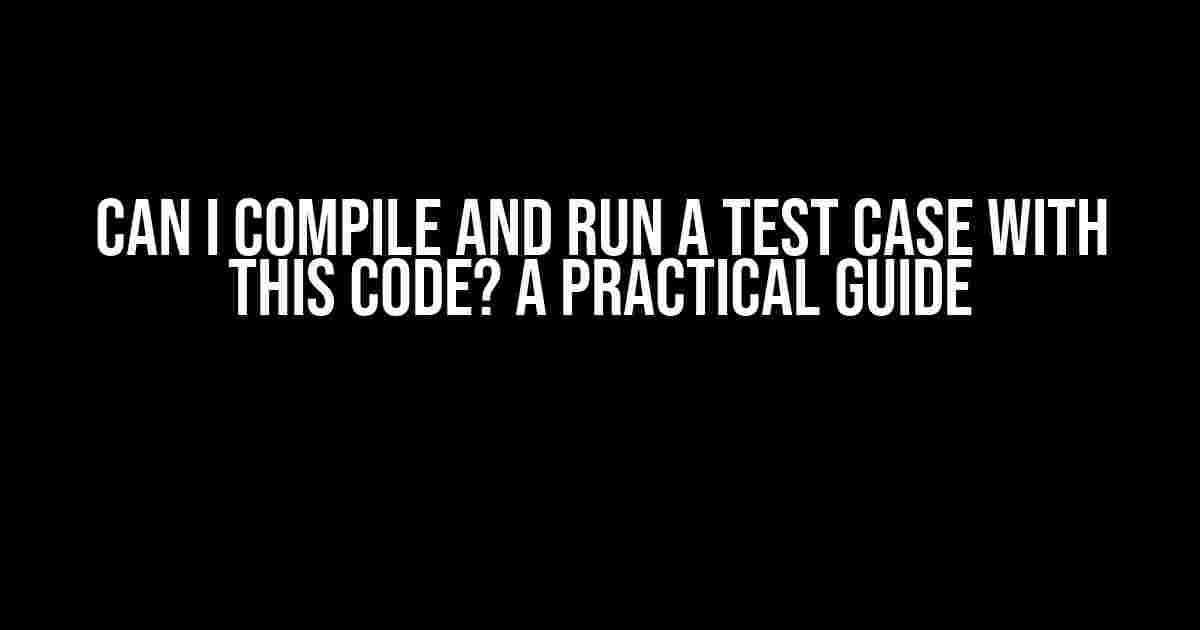Are you stuck with a piece of code that refuses to cooperate? Do you simply just want to know if it’s possible to compile and run a test case with your code? Well, you’re in luck! In this article, we’ll dive into the world of code compilation and test cases, exploring the ins and outs of what makes a code snippet tick. We’ll also examine a specific code example that’s causing trouble and provide actionable solutions to get you back on track.
Understanding Code Compilation and Test Cases
Before we dive into the meat of the matter, let’s take a step back and understand the basics. Code compilation is the process of translating written code into machine-readable instructions that a computer can execute. This process involves several stages, including:
- Preprocessing: The preprocessor reads the source code and expands any macros, includes header files, and performs other preliminary operations.
- Compilation: The compiler translates the preprocessed code into assembly code.
- Assembly: The assembler translates the assembly code into machine code.
- Linking: The linker resolves any external dependencies and creates an executable file.
A test case, on the other hand, is a set of inputs, execution conditions, and expected results used to verify the behavior of a piece of code. In other words, it’s a way to validate that your code works as intended.
The Problematic Code
Now, let’s take a look at the code that’s causing trouble:
#include <stdio.h>
int main() {
int arr[5] = {1, 2, 3, 4, 5};
int n = sizeof(arr) / sizeof(arr[0]);
printf("Array size: %d\n", n);
int sum = 0;
for (int i = 0; i < n; i++) {
sum += arr[i];
}
printf("Sum of array elements: %d\n", sum);
return 0;
}
This code seems simple enough, right? It’s intended to calculate the sum of an array of integers. But, when you try to submit it for other test cases, it fails miserably.
Why Does This Code Fail?
There are a few reasons why this code is causing issues:
- Array indexing: In C, arrays are 0-indexed, meaning the first element is at index 0, not 1. This might not be a problem in this specific example, but it’s essential to keep in mind for future coding endeavors.
- Lack of error handling: The code doesn’t account for potential errors, such as an empty array or invalid input. This can lead to unexpected behavior or crashes.
- Inadequate test cases: The code is only tested with a single, hardcoded array. What happens when the input changes? Will the code still work correctly?
Solution 1: Fixing Array Indexing
int n = sizeof(arr) / sizeof(arr[0]);
for (int i = 0; i <= n - 1; i++) {
sum += arr[i];
}
Solution 2: Adding Error Handling
if (n == 0) {
printf("Error: Empty array\n");
return 1; // Return an error code
}
for (int i = 0; i < n; i++) {
if (arr[i] < 0) {
printf("Error: Negative value in array\n");
return 1; // Return an error code
}
sum += arr[i];
}
Solution 3: Expanding Test Cases
| Test Case | Input | Expected Output |
|---|---|---|
| 1 | `int arr[] = {1, 2, 3, 4, 5};` | `Sum of array elements: 15` |
| 2 | `int arr[] = {-1, -2, -3, -4, -5};` | `Error: Negative value in array` |
| 3 | `int arr[] = {};` | `Error: Empty array` |
Conclusion
In conclusion, to answer your question: yes, it is possible to compile and run a test case with your code. However, it’s essential to identify and address the underlying issues, such as array indexing, error handling, and inadequate test cases. By implementing the solutions outlined above, you can create more robust and reliable code that passes with flying colors.
Remember, coding is all about experimentation, iteration, and perseverance. Don’t be discouraged by setbacks – use them as opportunities to learn and grow. Happy coding!
Frequently Asked Questions
Get answers to your burning questions about compiling and running test cases with problematic code!
Can I compile and run a test case with this code?
Yes, you can definitely try to compile and run a test case with the given code. However, be prepared for errors or unexpected results if the code contains logical flaws or syntax issues.
Why does my code fail when I try to submit it for other test cases?
There could be several reasons why your code fails for other test cases. It might be because your code doesn’t handle edge cases, has incorrect logic, or doesn’t meet the specific requirements of the problem. Review your code, debug it, and ensure it’s robust enough to handle different test cases.
How can I identify the issues in my code that’s causing it to fail?
To identify the issues, try to debug your code step by step, using print statements or a debugger to track the execution flow and variable values. You can also review the error messages or output to pinpoint the problem area. Additionally, make sure to test your code with different inputs and edge cases to catch any inconsistencies.
What are some common mistakes that can cause my code to fail for other test cases?
Some common mistakes include incorrect variable initialization, mistaken assumptions about input data, off-by-one errors, incorrect loop termination conditions, and forgetting to handle edge cases or special scenarios.
How can I make my code more robust to handle different test cases?
To make your code more robust, consider using defensive programming techniques, such as input validation, error handling, and boundary checking. Additionally, write thorough test cases to cover various scenarios, and ensure your code is modular, readable, and maintainable. This will help you catch and fix issues early on, making your code more reliable and efficient.
